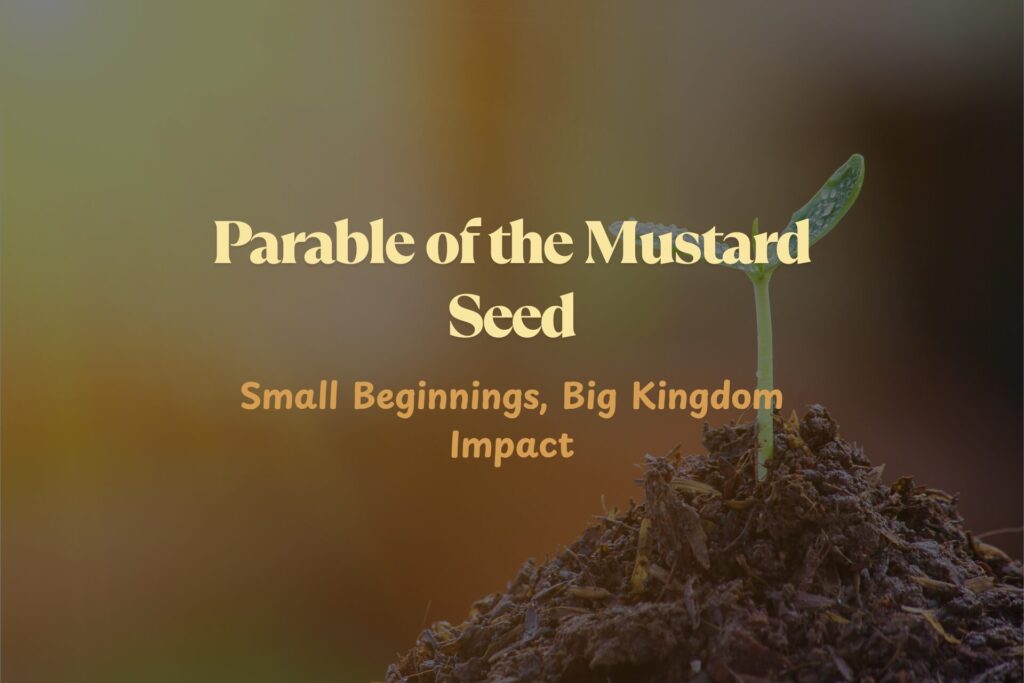“The kingdom of heaven is like a mustard seed…”
That one little sentence? Whew—it carries weight. Jesus had a way of saying a lot with very little. And in this case, He used one of the tiniest seeds in the ancient world to drop some serious Kingdom wisdom.
Let’s take a deep dive into the Parable of the Mustard Seed, unpack what it meant to people in Jesus’ time, and explore why this seemingly simple story still speaks so powerfully to us today.
Where Is the Parable of the Mustard Seed Found?
You’ll find it in all three Synoptic Gospels:
- Matthew 13:31–32
- Mark 4:30–32
- Luke 13:18–19
Here’s how it reads in Matthew:
“The kingdom of heaven is like a mustard seed, which a man took and planted in his field. Though it is the smallest of all seeds, yet when it grows, it is the largest of garden plants and becomes a tree, so that the birds come and perch in its branches.” (Matthew 13:31–32, NIV)
Short, sweet, and—when you really dig into it—deeply challenging.
Mustard Seed: Small But Mighty
Let’s talk about the mustard seed itself. In Jesus’ time, this seed was known for being tiny—about 1–2 millimeters in diameter. It wasn’t literally the smallest seed in existence (and Jesus’ audience would’ve known that), but it was used proverbially in Jewish culture to represent something exceedingly small.
Now here’s the thing: once planted, that little speck of a seed could grow into a massive bush—sometimes up to 10 feet tall or more. In fact, in Middle Eastern fields, mustard plants could take over entire areas and become almost tree-like, providing shelter for birds and shade for travelers.
So when Jesus used this image, people weren’t just thinking about a cute plant—they were thinking about something unexpectedly wild and unstoppable.
If you’re curious about how seeds and soil play an even bigger role in Jesus’ teachings, check out the Parable of the Sower, where He unpacks how our hearts respond to God’s Word.
How Would People in Jesus’ Time Have Understood This Parable?
Back then, folks were waiting for a kingdom. Like, a real one—with swords, kings, and a political revolution. Many Jews expected the Messiah to overthrow Roman oppression and restore Israel to glory.
So imagine how strange it sounded when Jesus said, “The kingdom of God is like a mustard seed.” Um… what? A seed? Not a throne? Not an army?
Yup. A seed.
Jesus was flipping expectations. He was showing that the Kingdom of God wouldn’t start with fanfare or fireworks. It would begin quietly—almost invisibly—but grow into something massive and transformational.
This parable would have hit His audience right in the gut. It was a reminder that God works through humble beginnings and quiet faithfulness—not always dramatic displays of power.
What Does the Parable of the Mustard Seed Mean Today?
Whew. So much. Here are a few powerful takeaways:
God’s Kingdom Often Starts Small
Don’t despise small beginnings. Whether it’s a whisper of faith, a new ministry, or a single prayer—you never know what God is growing underground.
Growth Takes Time, But It’s Coming
The seed doesn’t sprout overnight. Sometimes the Kingdom moves slowly, but trust—when God plants something, He intends to grow it.
God Uses the Unlikely
A tiny seed? That becomes a tree? God delights in taking the underestimated and turning it into something magnificent. (Yes, that includes you.)
Faith Has Multiplying Power
Your small act of faith can have generational impact. Just like that seed shelters birds and provides for others, your spiritual growth can create room for others to find rest and refuge.
Final Thoughts: Don’t Underestimate the Seed
Jesus wasn’t just telling people to chill and wait around. He was encouraging them—and us—to trust that God’s Kingdom is growing, even when we can’t see it. Even when it starts small. Even when it looks unimpressive.
And if you’ve ever felt like your faith was too small to matter? Remember this:
God isn’t looking for flashy. He’s looking for faithful.
So plant the seed. Water it with prayer. Watch what God does.

